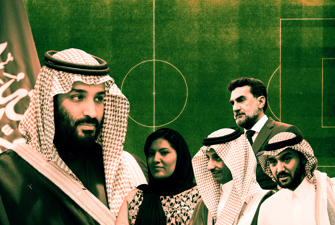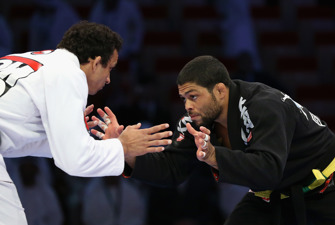Rich Gulf states are taking over combat sports
From Saudi Arabia’s takeover of boxing to Bahrain and the UAE’s investments in MMA, sovereign wealth funds backed by oil-rich monarchies are reshaping the combat sports space as fresh platforms for nation branding and the projection of soft power.
On October 28, 2023, some of the world’s most famous faces — including football star Cristiano Ronaldo and rappers Eminem and Kanye West — flocked to the Red Sea port of Jeddah in Saudi Arabia to attend the most anticipated boxing match of the season.
Dubbed the 'Battle of the Baddest,' the event pitted WBO heavyweight boxing champion Tyson Fury and former UFC heavyweight champion Francis Ngannou as the main event. The showcase bout also served as the grand opening of Riyadh Season, the kingdom’s heavily publicised winter extravaganza that forms part of Vision 2030.
The event was also an opportunity for Saudi Arabia to utilise its near-limitless wealth to distinguish itself with regard to how it produces its sporting events. From bespoke arenas and luxurious VIP enclosures to an elaborate opening ceremony and the dramatic arrival of a boxing ring emerging from beneath the stage floor, there was no shortage of opportunities for Saudi Arabia to present itself as the future of boxing.
The 'Battle of the Baddest' was an unequivocal success. Ngannou, a boxing debutant, caught Fury with an overhand left that sent the seasoned champion tumbling to the canvas. And though Fury eventually got up, he struggled for the rest of the fight and barely escaped with a controversial split decision victory.
The novelty fight, filled with dramatic twists and turns, changed the landscape of modern boxing beyond recognition, tipping the balance of scales from Las Vegas, the historic home for boxing’s biggest fights, to Riyadh. It elevated the status of Turki al-Sheikh, the chairman of Saudi’s General Entertainment Authority and a key figure within the inner circle of Saudi Crown Prince and de facto leader Mohamed bin Salman.
It also drew renewed attention to the berth of sovereign wealth funds owned by Arab states in the Persian Gulf that are influencing some of the world’s most popular, and violent, sports — a trend that is providing autocrats with a fresh platform for nation branding and projecting soft power.
'His Excellency'
At the centre of this development is Turki al-Sheik. His rise began in December 2018, when King Salman bin Abdulaziz issued a number of royal decrees that included orders to reshuffle the council of ministers. That included the appointment of al-Sheik, the former president of the Sports Authority, as the chairman of Saudi’s General Entertainment Authority.
At the time al-Sheikh’s tenure at the helm of the sports authority had resulted in several well-publicised scandals, most notably in 2017 when he attempted to influence Egypt’s most popular soccer club, Al Ahly.
He returned to Saudi Arabia and focused the vast majority of his energy on managing the country’s entertainment sector, while the kingdom formed an official ministry of sports to handle its ambitious sports strategy — a strategy rooted in the kingdom’s Vision 2030 initiative, which laid a blueprint for Saudi Arabia’s socio-political and economic reforms.
By 2018, the fruits of Saudi Arabia’s efforts had begun to ripen. The kingdom struck deals to stage the Italian Super Cup and Spanish Super Cup until 2029. World Wrestling Entertainment (WWE) announced a 10-year deal to host bi-annual events in the kingdom, while the kingdom also hosted its first-ever professional boxing event that year—a super middleweight title fight between Callum Smith and George Groves that served as the final of the World Boxing Super Series on September 28, 2018.
Four days later, Washington Post columnist Jamal Khashoggi was assassinated inside the Saudi consulate in Istanbul, Turkey. The subsequent fallout, which saw US officials conclude that Bin Salman authorised the assassination, led sports leagues and athletes to temporarily reconsider their association with the kingdom.
This did not last long.
Having assumed his role as the kingdom’s entertainment czar, al-Sheikh became responsible for some of the kingdom’s biggest shows, including the WWE, which hosted its second major show in Saudi just weeks after Khashoggi’s assassination — a decision that helped normalise relations with the kingdom thereafter.
In 2019, Al-Sheikh expanded his influence in the sports world when he purchased the Spanish football club Almeria. He also launched Riyadh Season, the entertainment festival that operates in tandem with the country’s tourism authority.
However, al-Sheikh’s crowning achievement has arguably been his ability to secure some of the biggest heavyweight boxing spectacles in recent memory, further cementing the kingdom as a global hub for combat sports to rival Las Vegas and Abu Dhabi.
Apart from securing Fury vs. Ngannou as the opening act for the latest edition of Riyadh Season, al-Sheikh was also instrumental in negotiating the undisputed heavyweight championship fight between Fury and Oleksandr Usyk, the Ukrainian boxer who holds the three other heavyweight belts belonging to the IBF, WBA and WBO sanctioning bodies.
Elsewhere, al-Sheikh also helped bring about Saudi Arabia’s first-ever Ultimate Fighting Championship (UFC) event, which will take place in June 2024.
Boxing fans and media refer to Turki al-Sheik as 'His Excellency' due to his skills in securing big fights for his country. Photo: Justin Setterfield / Getty Images
After a few missteps during his tenure as chairman of Saudi’s sports authority, al-Sheikh has since found his momentum as the kingdom’s entertainment czar, utilising Saudi’s vast resources to establish one of the world’s largest festivals. He has also utilised that entertainment platform to amalgamate some of the most anticipated fights in recent memory, further advancing Saudi Arabia’s sports ambitions.
Since the ‘Battle of the Baddest’ in October 2023, al-Sheikh has put on another two boxing events featuring some of the biggest names in heavyweight pugilism. In December 2023, he hastily assembled a “Day of Reckoning” event featuring Anthony Joshua and Deontay Wilder in the co-main events. In March 2024, he held “Knockout Chaos” featuring a main event between Joshua and Ngannou.
Al-Sheikh has since announced a series of blockbuster boxing showcases, including an undisputed light-heavyweight bout between Artur Beterbiev and Dmitry Bivol, as well as an undisputed heavyweight championship showdown pitting Fury vs Oleksandr Usyk. He even managed to get promoters Eddie Hearn and Frank Warren — sworn enemies in British boxing — to agree to a 5 vs. 5 card featuring talent from their respective rosters.
Al Sheikh’s recent success in boxing — a sport that is notorious for reaching dead ends in negotiations for big fights — has elevated him to one of the most influential figures in the space. He is referred to by boxing fans and media as “His Excellency,” further emphasising his growing cult of personality.
However, while Al Sheikh may be one of the best-known figures in combat sports, he is far from the first Gulf state official to venture into this space.
The prince’s fight club
In Bahrain, the ruling Al Khalifa family is no stranger to using sports as a tool for soft power either. The kingdom has played host to a Formula 1 Grand Prix event since 2004 — the first of its kind in the Middle East — and has utilised the event to promote tourism and an image of peace and prosperity.
Bahraini activists have accused Bahrain of using the Grand Prix to sportswash its reputation abroad—a topic that was recently discussed during the UK House of Lords’ first-ever debate on sportswashing.
While the Bahrain Grand Prix remains a lightning rod of controversy, the royal family’s MMA venture continues to fly under the radar despite being utilised for similar purposes.
In 2015, Sheikh Khalid Bin Hamad Al Khalifa, the fifth son of Bahrain’s King Hamad Bin Isa Al Khalifa, financed the development of the Island nation’s first fully functional MMA fight club and training facility, known as KHK MMA. He also founded Bahrain’s first MMA promotion, Brave Combat Federation, which has since emerged as the most prominent MMA organisation in the Arab world.
As the primary patron of the KHK fight club, Sheikh Khalid provided significant incentives for those who joined the team. KHK members were given access to elite resources at no cost, including medical coverage, as well as monthly stipends high enough to cover their living expenses. Among the gym’s early members were UFC lightweight champion Islam Makhachev, former UFC champion Khabib Nurmagomedov, as well as UFC star Conor McGregor’s coach John Kavanaugh.
Originally a military man, Sheikh Khalid became fascinated with martial arts, taking it upon himself to foster their development in his country. Apart from being the president of Bahrain’s Olympic Committee, he has personally competed in a pair of amateur MMA fights and regularly trains at the KHK facility.
While Sheikh Khalid has not been personally indicted in any wrongdoing, he is a member of a monarchy with a well-documented record of human rights violations, including limited freedom of expression, intimidation of dissidents, and the mistreatment of political opponents.
Beyond his investments in the domestic MMA market, Sheikh Khalid’s Brave CF entered a longstanding partnership with the International Mixed Martial Arts Federation (IMMAF), the international governing body for amateur MMA. Bahrain has hosted three consecutive editions of the IMMAF World Championships, and helped cultivate fighters in the amateur circuit.
Much of these efforts were aimed at ultimately facilitating the inclusion of MMA in the Olympic Games — an accomplishment that even the UFC has not yet realised.
It's uncertain whether Sheikh Khalid will succeed in securing MMA's spot in the Olympics. Nevertheless, his expanding influence in the MMA sphere indicates that his involvement in the sport goes beyond projecting soft power, which is the primary purpose of the Bahrain Grand Prix. It also signifies his aim to transform the entire landscape of MMA.
Gulf States clamouring for combat sports
Sheikh Khalid’s successful MMA venture has resulted in a series of similar investments across the region.
In 2019, the UFC signed a five-year deal with the Abu Dhabi Department of Culture and Tourism— a deal that reportedly saw the UFC get paid approximately 25 million US dollars per show. Their relationship flourished further during the pandemic when the Abu Dhabi government constructed a bespoke arena on Yas Island — dubbed 'Fight Island' — that allowed the UFC to continue to operate.
Kamaru Usman kicks Khamzat Chimaev in a middleweight fight during the UFC 294 event in October 2023 in Abu Dhabi. Photo Chris Unger / Getty Images
In 2023, the UFC extended its partnership with Abu Dhabi through 2028, ensuring that the Emirate will remain the premier destination for UFC events in the region.
Qatar also joined the MMA scene last year when it partnered with ONE Championship, Asia's largest combat sports promotion. The Singapore-based MMA organisation held its first event in Qatar in March 2024, which was broadcast on the Qatar-owned beIN Sports network as part of a multi-year broadcast partnership.
The Qatar Olympic Committee also established an MMA association that is being advised by GAMMA, the other international governing body for amateur MMA.
At the same time, Saudi Arabia made its inaugural investment in the MMA realm by injecting $100 million into the US-based Professional Fighters League.
Although the UFC continues to reign as the foremost entity in MMA, commanding the lion's share of the sport's market and top talent, MMA's potential for growth, along with its alignment with a conventional concept of masculinity, positions it as an ideal medium for Gulf states to shape and showcase their values. It serves as a valuable tool for soft power, sports tourism, and projecting power on the international stage.
As these states continue to invest in and influence the MMA landscape, their strategic engagement underscores the sport's role as a multifaceted platform for cultural diplomacy and socio-political messaging in the modern world.







